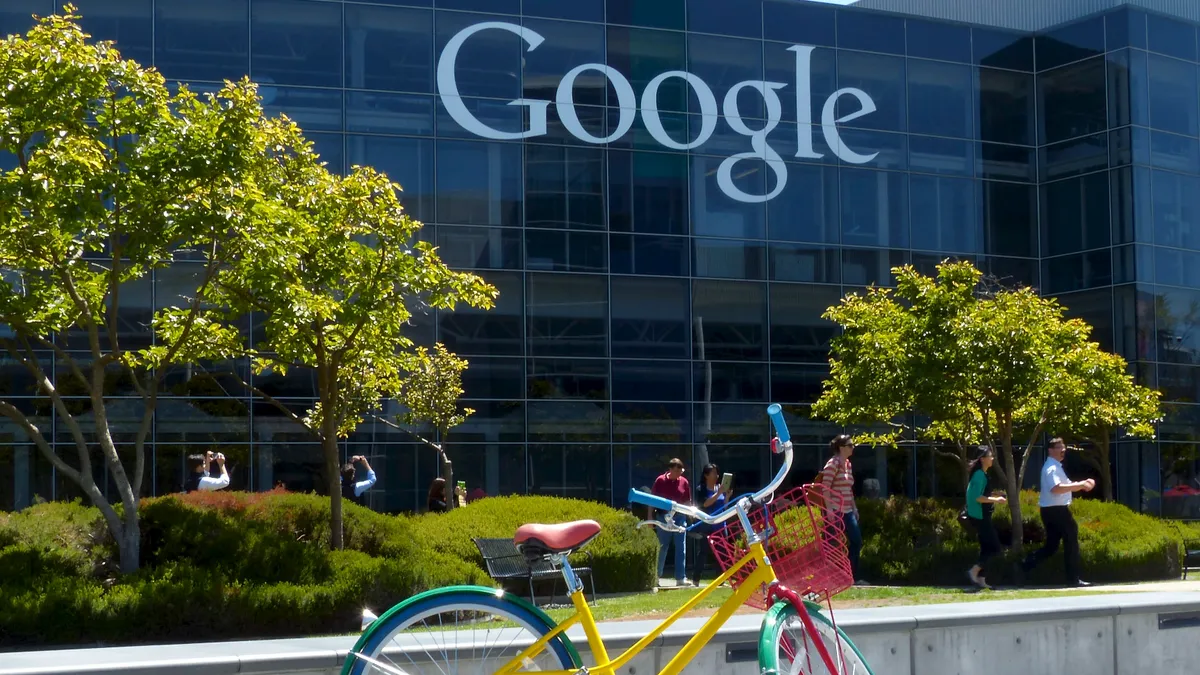Dive Brief:
- Google set a goal of achieving 24/7 renewable power supply in 2018, and on Monday CEO Sundar Pichai unveiled the company's planned path forward and a ten-year timeline.
- The company's plan relies on two-pronged approach: signing additional power purchasing agreements (PPAs) that incorporate a mix of renewable resources, and aligning data center power needs with the regional availability of renewable energy.
- Google remains a trendsetter among corporations looking to push the envelope on renewable energy, according to the Renewable Energy Buyers Alliance (REBA). But an analyst with BloombergNEF said it could be some time before other companies are positioned to follow Google's lead.
Dive Insight:
Google may have a plan for reaching its 24/7 renewable energy target by 2030, but that doesn't mean the path to get there is going to be straightforward, according to Kyle Harrison, a senior associate with BloombergNEF.
Google already offsets 100% of its electricity consumption with renewable generation of some form — no small feat, according to Harrison, considering the company's use of electricity increased significantly from 2010 to 2018, and will likely continue to grow. But according to a new Google white paper, the internet giant still draws 39% of its power from carbon-based sources if hour-by-hour, region-by-region consumption is taken into account.
Eliminating those emissions, Pichai wrote in a company blog post, "is our biggest sustainability moonshot yet, with enormous practical and technical complexity. We are the first major company that's set out to do this, and we aim to be the first to achieve it."
REBA, of which Google is a member, met the announcement with praise. "Google in particular is a leader in the pivot toward 24/7, 365 carbon-free energy," REBA senior director Kevin Haley said in a statement. "Their willingness to deploy corporate resources, set visionary goals and develop buy-in at the highest levels of the company should be a signal to peers, policymakers and energy companies about the future of energy around the world."
Harrison doesn't doubt that Google will find a way to achieve its goal by the 2030 deadline. But getting there will require trial and error on a level most companies aren't able to muster.
"I do not see any other companies doing this in the immediate term," he said. "There is an opportunity here for Google to play around with some things, and for other companies to take those best practices and apply them. But it's important to keep in mind that Google made this announcement at the end of 2018 ... and we haven't seen anything similar."
Google's strategy relies in part on aligning operations at its data centers with the availability of renewable energy in the surrounding region. That's easier said than done, Harrison said, but because Google is a technology company, it has the means and ability to optimize its operations in such a fashion. Other tech companies could potentially follow suit or even buy the necessary software from Google, but their approach could have limited applications in other industries, according to Harrison.
That strategy will only take Google so far, he said. "One good way to think about it," said Harrison, "is Google can achieve this goal by buying a lot of clean energy and not optimizing their data centers, but they can't do the opposite."
Although Google's white paper hints at an interest in battery storage and other emerging technologies such as advanced nuclear, geothermal, hydrogen and carbon capture, cost-effective storage at the scale required by Google is not yet available in all regions in which it operates, Harrison said. That means that Google will have to rely on purchases of diverse resources — pairing wind with solar, for example — to expand the duration in which renewable energy is available, at least for the time being.
"Other companies aren't going to have the bandwidth do to some of these things," Harrison said. "Not every company can buy complementary wind on top of solar — that's a huge investment."
Over time, Harrison suspects Google's actions will help to open up growing markets for mixed-resource PPAs, and eventually PPAs with a storage component, making these options more accessible to other firms.
"They have been a trailblazer in the space," he said. "They've innovated a lot, and if there was a company that could pull this off, it's going to be Google."














